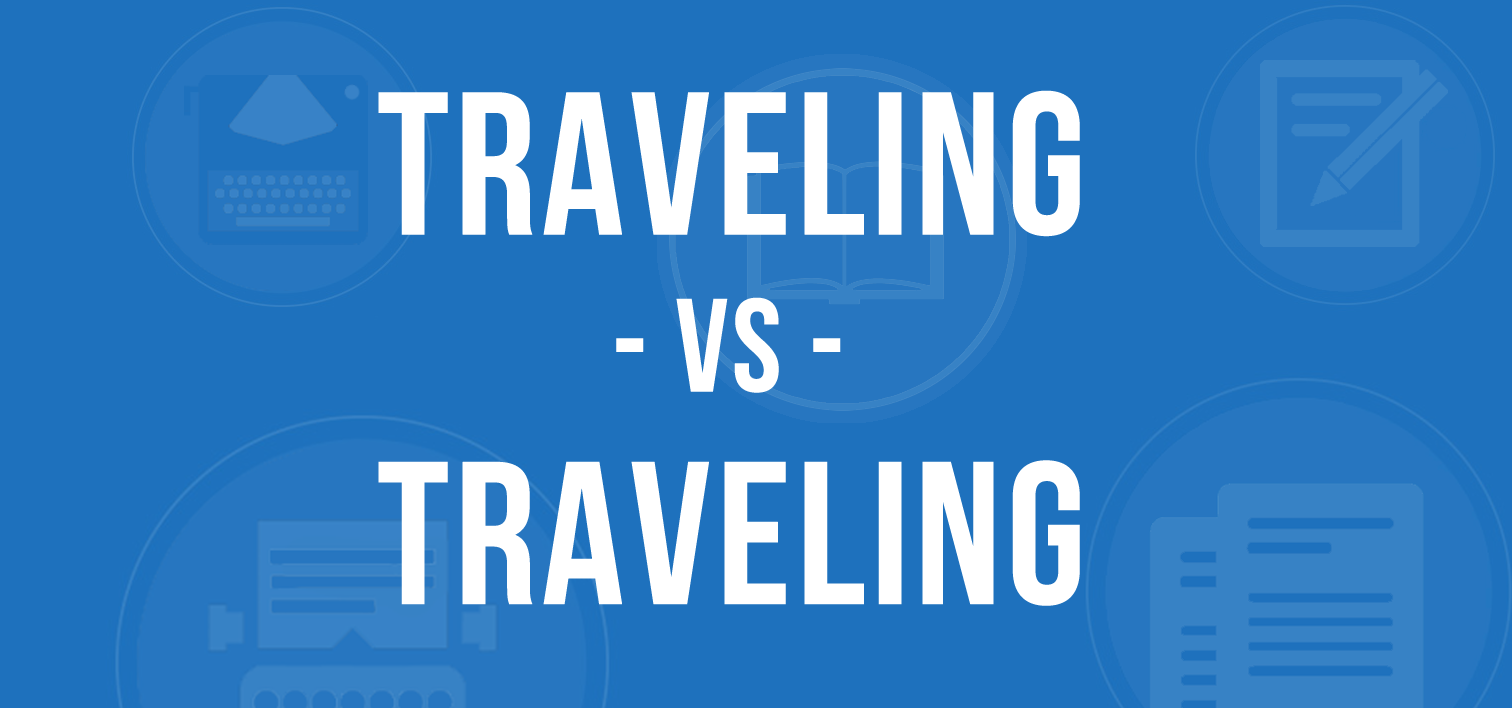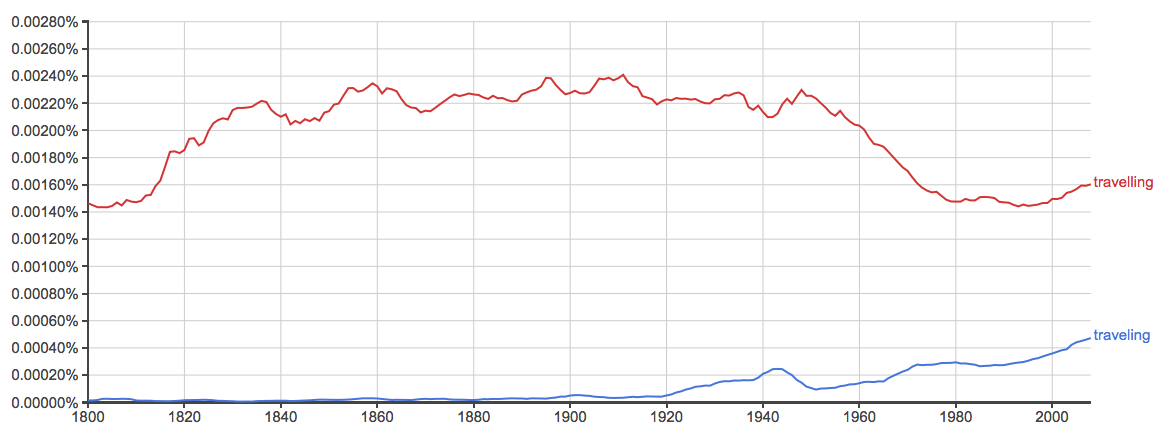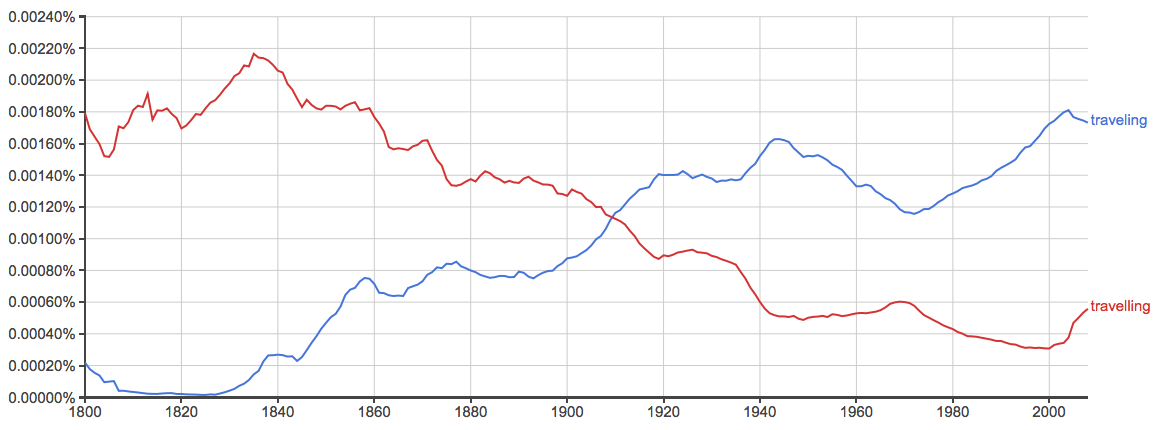Как пишется travelling или traveling

I travel
you travel
he/she/it travels
we travel
you travel
they travel
I have travelled
you have travelled
he/she/it has travelled
we have travelled
you have travelled
they have travelled
I am travelling
you are travelling
he/she/it is travelling
we are travelling
you are travelling
they are travelling
Present Perfect Continuous
I have been travelling
you have been travelling
he/she/it has been travelling
we have been travelling
you have been travelling
they have been travelling
I travelled
you travelled
he/she/it travelled
we travelled
you travelled
they travelled
I was travelling
you were travelling
he/she/it was travelling
we were travelling
you were travelling
they were travelling
I had travelled
you had travelled
he/she/it had travelled
we had travelled
you had travelled
they had travelled
Past Perfect Continuous
I had been travelling
you had been travelling
he/she/it had been travelling
we had been travelling
you had been travelling
they had been travelling
I will travel
you will travel
he/she/it will travel
we will travel
you will travel
they will travel
I will be travelling
you will be travelling
he/she/it will be travelling
we will be travelling
you will be travelling
they will be travelling
I will have travelled
you will have travelled
he/she/it will have travelled
we will have travelled
you will have travelled
they will have travelled
Future Perfect Continuous
I will have been travelling
you will have been travelling
he/she/it will have been travelling
we will have been travelling
you will have been travelling
they will have been travelling
I would travel
you would travel
he/she/it would travel
we would travel
you would travel
they would travel
Conditional Present Continuous
I would be travelling
you would be travelling
he/she/it would be travelling
we would be travelling
you would be travelling
they would be travelling
I would have travelled
you would have travelled
he/she/it would have travelled
we would have travelled
you would have travelled
they would have travelled
Conditional Perfect Continuous
I would have been travelling
you would have been travelling
he/she/it would have been travelling
we would have been travelling
you would have been travelling
they would have been travelling
to travel
to have travelled
to be travelling
to have been travelling
travell travellled / travellled / travellling / travells
I travell
you travell
he/she/it travells
we travell
you travell
they travell
I have travellled
you have travellled
he/she/it has travellled
we have travellled
you have travellled
they have travellled
I am travellling
you are travellling
he/she/it is travellling
we are travellling
you are travellling
they are travellling
Present Perfect Continuous
I have been travellling
you have been travellling
he/she/it has been travellling
we have been travellling
you have been travellling
they have been travellling
I travellled
you travellled
he/she/it travellled
we travellled
you travellled
they travellled
I was travellling
you were travellling
he/she/it was travellling
we were travellling
you were travellling
they were travellling
I had travellled
you had travellled
he/she/it had travellled
we had travellled
you had travellled
they had travellled
Past Perfect Continuous
I had been travellling
you had been travellling
he/she/it had been travellling
we had been travellling
you had been travellling
they had been travellling
I will travell
you will travell
he/she/it will travell
we will travell
you will travell
they will travell
I will be travellling
you will be travellling
he/she/it will be travellling
we will be travellling
you will be travellling
they will be travellling
I will have travellled
you will have travellled
he/she/it will have travellled
we will have travellled
you will have travellled
they will have travellled
Future Perfect Continuous
I will have been travellling
you will have been travellling
he/she/it will have been travellling
we will have been travellling
you will have been travellling
they will have been travellling
I would travell
you would travell
he/she/it would travell
we would travell
you would travell
they would travell
Conditional Present Continuous
I would be travellling
you would be travellling
he/she/it would be travellling
we would be travellling
you would be travellling
they would be travellling
I would have travellled
you would have travellled
he/she/it would have travellled
we would have travellled
you would have travellled
they would have travellled
Conditional Perfect Continuous
I would have been travellling
you would have been travellling
he/she/it would have been travellling
we would have been travellling
you would have been travellling
they would have been travellling
to travell
to have travellled
to be travellling
to have been travellling

существительное
прилагательное
Мои примеры
Словосочетания
Примеры
The order is traveling by plane.
Заказ отправлен авиапочтой.
The birds are traveling south for the winter.
Птицы перелетают на Юг для зимовки.
We will be traveling into the city from the west.
Мы будем въезжать в город с Запада.
I assured him that traveling to Cambodia was safe.
Я заверил его, что путешествовать в Камбоджу безопасно.
He enjoys traveling to remote and exotic destinations.
Ему очень нравится путешествовать в отдалённые и экзотические места.
The car was traveling at 70 miles per hour.
Автомобиль ехал со скоростью семьдесят миль в час.
I relish traveling to new places.
Я с удовольствием путешествую по новым местам.
She enjoys traveling around Europe.
Она любит путешествовать по Европе.
Are you traveling by train or by bus?
Ты путешествуешь поездом или автобусом?
They dream of traveling to distant suns.
Они мечтают о путешествиях к далёким звёздам.
He regrets not traveling more when he was younger.
Он жалеет о том, что мало путешествовал, когда был помоложе.
I spent the whole summer traveling through Europe.
Всё лето я путешествовал по Европе.
It’s not wise to risk traveling so soon after surgery.
Неразумно рисковать, путешествуя так скоро после операции.
Are you prepared to risk traveling without an armed guard?
Вы готовы рискнуть, путешествуя без вооруженного охранника?
The mere idea of your traveling alone to Europe is ridiculous.
Сама мысль о том, что ты поедешь в Европу в одиночку, просто смешна.
They met a fellow Canadian countryman while traveling in France.
Во время путешествия по Франции они встретили земляка-канадца.
When traveling through the city, tourists should be extra vigilant.
Туристы должны быть особенно бдительными во время путешествия по этому городу.
In some countries a woman traveling alone was traditionally regarded as a trollop.
В некоторых странах женщины, путешествующие в одиночку, традиционно считались шлюхами.
While traveling the ancient Silk Road, traders were constant prey to cutthroats and thieves.
Путешествуя по древнему Шёлковому пути, торговцы постоянно становились жертвами головорезов и воров.
You’ll enjoy traveling more if you read up on the history of the countries you’ll be visiting.
Вы получите от путешествий больше удовольствия, если предварительно изучите историю страны, которую собираетесь посетить.
Nowadays my only opportunity for an old-fashioned, self-indulgent sulk comes when I’m traveling.
Теперь единственная моя возможность обижаться по-старомодному, потакая своим желаниям, приходит во время путешествий.
Примеры, ожидающие перевода
That car was really traveling when it passed us.
I was fired with enthusiasm to go traveling in Asia.
She was salivating at the prospect of traveling to Europe.
Travelling or Traveling: What’s the Difference?
Home » Travelling or Traveling: What’s the Difference?
Are you taking a trip anytime soon? If so, where will you be traveling? Or is it travelling? How exactly do you spell this word?
The two words traveling and travelling can cause some confusion for those writers not exactly sure when to use which one. Are they just variations of the same word? Do they have different meanings? Do they function differently in a sentence?
In today’s post, I want to address all of these questions so you will never again wonder or second-guess yourself, “Is it travelling or traveling?”
The Difference Between Travelling and Traveling
Travelling and traveling are both verbs, obviously. To travel is to go from one place to another, as on a trip or journey. For example,
You’re probably still thinking, “Okay, I still don’t know how to use these words.”
The difference between traveling vs. travelling isn’t much of a difference at all, really.
In fact, the difference between them is entirely dialectal. There is no demonstrable difference of sense or function, meaning both words can be used interchangeably.
When to Use Travelling
Even though the only thing separating travelling and traveling is a dialectical difference, it is still important to keep your audience in mind when picking which word to use and when.
Travelling (with two Ls) is the preferred spelling in British English and is used much more frequently than is traveling. The graph below shows the use of travelling vs. traveling (as a percentage of all words used) in British English books, journals, and magazines from 1800 to 2008.
As you can see, travelling (with two Ls) clearly dominates in British English, being used at a rate of about 4:1.
Now, if we look at the same two words over the same time period but limit our search to American print sources, the results completely flip.
There’s actually a bigger gap between traveling and travelling in American English than there is in British English.
When to Use Traveling
As indicated in the above graph, traveled (with one L) is the preferred spelling in American English.
I’ve discussed the reason for the popularity of many shortened spellings in American English in other posts (cancelled/canceled comes to mind), but the basic reason stems back to Noah Webster himself.
He is usually credited with the shortening of many American spellings because in his original 1898 dictionary, he sought to simplify many British spellings he saw as unnecessary. This is where the British-American divide over words like color/colour came from.
Anyway, the point is, if you are writing to an American audience, traveling (with one L) is your best choice.
Remember the Difference – Traveling or Travelling?
One simple way to keep track of these two words is that the shorter spelling is American. If you can keep in mind that, generally speaking, British English favors (favours) the longer spelling of words, you will be able to remember the difference between these words.
It is also worthwhile to note that all of the distinctions in this post apply equally to travelled vs. traveled, traveled vs. travelled, traveller vs. traveler, traveler vs. traveller, etc.
Summary – Traveling vs. Travelling
Is it traveling or travelling? That depends on where you are writing and who is your audience.
Whether you’re talking about travelled or traveled or traveller or traveler, these same preferences still apply.
Traveling or Travelling?
It’s wonderful to travel—to meet new people, see new places, experience different cultures, live life the way life is lived somewhere else. Plenty of good things are associated with travel, but there’s one particular issue that can make traveling annoying: the spelling. Travel is easy enough to spell and not at all confusing, but “traveling,” “traveler,” “traveled”? These words are a common cause of confusion because some people spell them with one L while others use two.
Traveling or travelling depends on where is your audience. Traveling is the preferred spelling in the U.S. Travelling is the preferred spelling in the UK or in the Commonwealth. This American-British spelling difference carries for other forms: traveled or travelled and traveler or traveller.
Traveling vs. Travelling
The word travel has more than one syllable—it’s a multisyllabic word. In American English, when a multisyllabic word ends in a vowel and a consonant (in that order), you double the consonant when adding a suffix only if the stress falls on the final syllable. For instance, in the word repel, the stress falls on the final syllable, which means that you double the consonant when you add a suffix: repelling. But in travel, the stress falls on the first syllable, so there’s no doubling. 
The United States is pretty much alone in using the shorter form. Canada and Australia generally follow the rules of British English, and that’s why Canadians and Australians can be fond of travelling, not traveling.
By now, you probably know when to use which spelling—it should conform to the place your audience is. If you’re writing a paper for a college class in the United States, you should use the shorter spelling. However, if you live in the United States but are applying for a job in Australia, you could instead choose to use the spelling they prefer.
Travelling and Traveling: Examples
As a visitor traveling from the United States, you must obtain a visa, which you can apply for before you leave for Cuba. —Conde Nast Traveler
As the reporters who traveled to the Group of 20 summit meeting with President Obama from Hawaii piled out and walked under the wing to record his arrival… —The New York Times
Passengers travelling to Bristol Airport are being urged to leave extra time as roadworks clog up a major link road for an entire month. —Bristol Post
Originally from Athens, and having lived in London for five years, he’d travelled on the train specifically to head in to town to “see the drunken crowds. It should be fun.” —The Guardian

существительное ↓
прилагательное ↓
Мои примеры
Словосочетания
Примеры
The car was travelling at high speed.
Автомобиль мчался с большой скоростью.
He advised me against travelling.
Он отговорил меня от поездки.
I expect you do quite a bit of travelling?
Я так полагаю, что вы довольно много путешествуете?
Travelling alone can lead to a loss of identity.
Путешествие в одиночку может привести к утрате собственной идентичности.
The idea of travelling through time fascinates me.
Идея путешествия во времени захватывает меня.
The firm will recompense you for any travelling costs.
Фирма компенсирует вам все дорожные расходы.
The train was travelling at 100 mph.
Поезд двигался со скоростью сто миль в час.
The firm must compensate you for your travelling costs.
Фирма должна оплатить вам дорожные расходы.
Sometimes I feel like packing it all in and going off travelling.
Иногда мне хочется всё это бросить и отправиться в путешествие.
It’s useful to know several foreign languages when you are travelling abroad.
Полезно знать несколько иностранных языков, если вы путешествуете за границей.
She saw him in his travelling trim.
Она видела его в дорожном костюме.
Chantal prefers travelling by train.
Шанталь предпочитает путешествовать поездом.
Ripe grasses trammel a travelling foot.
. Так высока трава, что путник не пройдёт. (А.Суинбёрн, «Атланта в Калидоне»)
After retiring, we’ll do some travelling.
После выхода на пенсию мы будем путешествовать.
The Renault was travelling at about 50 mph.
«Рено» двигался со скоростью около пятидесяти миль в час.
The car was travelling at a very slow speed.
Автомобиль ехал очень медленно.
She was travelling parallel to her previous route.
Она ехала параллельно своему прежнему маршруту.
The firm will repay you for your travelling costs.
Фирма оплатит вам дорожные расходы.
My new job will mean travelling all over the world.
Моя новая работа будет означать путешествия по всему миру.
The firm will reimburse you for any travelling costs.
Фирма компенсирует вам все дорожные расходы.
The yachts were kept travelling from start to finish.
Яхты двигались очень быстро с самого старта и до финиша.
If you enjoy travelling, young children can be a tie.
Если вы любите путешествия, маленькие дети могут этому помешать.
The best way to round out your education is by travelling.
Лучше всего завершить обучение путешествиями.
We’d been forewarned of the dangers of travelling at night.
Нас предупредили об опасности путешествий в ночное время.
They were still travelling along the same line of longitude.
Они по-прежнему двигались вдоль одного и того же меридиана.
Cars in the fast lane were travelling at over 80 miles an hour.
На полосе обгона автомобили развивали скорость свыше восьмидесяти миль в час.
Her equipage was a travelling postchaise with one pair of horses.
Экипажем ей служил почтовый дилижанс, запряжённый парой лошадей.
The Astra Satellite is travelling some 23,000 miles out in space.
Искусственный спутник «Astra» летит на расстоянии около 23 000 миль в космосе.
While travelling abroad, take preventive measures to avoid illness.
Путешествуя за границей, примите профилактические меры, чтобы не заболеть.
Anyone travelling without a passport runs the risk of being arrested.
Все, кто путешествует без паспорта, рискуют быть арестованными.
Примеры, ожидающие перевода
The truck was travelling at a speed of 50 mph.
She palled up with Neil while travelling round Europe.
Mom wasn’t happy about Tess going off travelling on her own.




